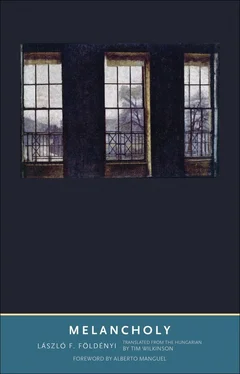László Földényi - Melancholy
Здесь есть возможность читать онлайн «László Földényi - Melancholy» весь текст электронной книги совершенно бесплатно (целиком полную версию без сокращений). В некоторых случаях можно слушать аудио, скачать через торрент в формате fb2 и присутствует краткое содержание. Год выпуска: 2016, Издательство: Yale University Press, Жанр: Современная проза, на английском языке. Описание произведения, (предисловие) а так же отзывы посетителей доступны на портале библиотеки ЛибКат.
- Название:Melancholy
- Автор:
- Издательство:Yale University Press
- Жанр:
- Год:2016
- ISBN:нет данных
- Рейтинг книги:4 / 5. Голосов: 1
-
Избранное:Добавить в избранное
- Отзывы:
-
Ваша оценка:
- 80
- 1
- 2
- 3
- 4
- 5
Melancholy: краткое содержание, описание и аннотация
Предлагаем к чтению аннотацию, описание, краткое содержание или предисловие (зависит от того, что написал сам автор книги «Melancholy»). Если вы не нашли необходимую информацию о книге — напишите в комментариях, мы постараемся отыскать её.
, with its profusion of literary, ecclesiastical, artistic, and historical insights, gives proof to such praise. His book, part history of the term
and part analysis of the melancholic disposition, explores many centuries to explore melancholy’s ambiguities. Along the way Földényi discovers the unrecognized role melancholy may play as a source of energy and creativity in a well-examined life.
Földényi begins with a tour of the history of the word
from ancient Greece to the medieval era, the Renaissance, and modern times. He finds the meaning of melancholy has always been ambiguous, even paradoxical. In our own times it may be regarded either as a psychic illness or a mood familiar to everyone. The author analyzes the complexities of melancholy and concludes that its dual nature reflects the inherent tension of birth and mortality. To understand the melancholic disposition is to find entry to some of the deepest questions one’s life.
This distinguished translation brings Földényi’s work directly to English-language readers for the first time.
Melancholy — читать онлайн бесплатно полную книгу (весь текст) целиком
Ниже представлен текст книги, разбитый по страницам. Система сохранения места последней прочитанной страницы, позволяет с удобством читать онлайн бесплатно книгу «Melancholy», без необходимости каждый раз заново искать на чём Вы остановились. Поставьте закладку, и сможете в любой момент перейти на страницу, на которой закончили чтение.
Интервал:
Закладка:
Boredom permeates the modern world; 21it is born in the bourgeois world, but that same world condemns it and disowns it like a stepchild. Boredom results in idleness (though the person who is bored, as in the case of seventeenth-century nobility, has nothing to do in the first place), and idleness is branded by the world at large as laziness , which, next to sorrow and boredom, is the third main trait of melancholia in the modern age. In the Middle Ages, sloth, or acedia, likewise denoted neglect of earthly business, but it was condemned first and foremost as a sin against God; in the modern age, however, it was not so much a sin against God as against the world. 22The world can offer a million arguments and charges against lazy people — those reasons, however, become self-defeating at some point. Bored people are fed up with the world, and that is a sign of the tediousness of the world itself. “Why, then, is action more justified than inaction?” a bored person might ask, and since boredom is intertwined with dire melancholia, drawing attention to the transience and dissolution that lie in wait in everything, he receives no satisfactory answer. Others, of course, list numerous reasons, from the practical aspects of making money to the metaphysical notion of self-creation, yet none of that moves a bored, lazy person, and to borrow some words from Friedrich Schlegel: “What’s the point, then, of this unremitting aspiration and progress without rest and purpose? Can this storm and stress provide nourishing sap or beautiful form to the infinite plant of humanity, growing unnoticed by itself and cultivating itself? This empty, restless activity is nothing but a Nordic barbarity and so leads to nothing but boredom — our own and others!” ( Lucinde and the Fragments , 65).
Of course, not every lazy person is melancholic; but the possibility of turning melancholic is implied in laziness, as much as in boredom. 23There is no great diversity in the expression of indolence, yet on the other hand, it can be experienced in many ways: those who become melancholic (or those melancholics who become lazy) are characterized by the aforesaid desperate boredom. The laziness of those who are beyond the daily arrangements of this world, and whose boredom is boundless, is not laziness in the ordinary sense of the word: their inaction is a kind of negative occupation . Petrarch contrasted the miser occupatus —the wretched workaholic — with the felix solitarius —the happy loner; people who immerse themselves in philosophical preoccupations are, from a certain viewpoint, happy — happy because, presumably, they experience the world differently from people who hustle and bustle. Meditation has always been one of the distinguishing marks of melancholia; in its own fashion, it facilitates the creation of a new world in much the same way as regular work does. In the eyes of a bored and “idle” melancholic, there is in any case no essential difference between contemplation and practical occupation — it was a distinction dreamed up by a bustling world, among other reasons, precisely so that it might brand melancholics, stigmatize them as outlaws, detrimental to the cause of civil society. Robert Burton, who in many respects was still a child of the Middle Ages, explained how a conscientious citizen saw the general melancholia of the nobility of his days as a function of their laziness and idleness: “For idleness is an appendix to nobility; they count it a disgrace to work, and spend all their days in sports, recreations, and pastimes, and will therefore take no pains; be of no vocation; they feed liberally; fare well, want exercise, action, employment. . and company to their desires” (Burton, Anatomy , partition 1, sec. 2, member 2, subsec. 6, 244). Such nobles were not simply idle, however: they were different from ordinary civilians. Even if a growing bourgeoisie managed to “break them in” (that is, either persuade them to adjust to a civil mentality or destroy them), it was unable to prevent indolence and inactivity, hitherto considered the preserve solely of the nobility, from raising their heads within the civil world as well: it has already been seen how Sir William Temple in 1690, a full generation after the Civil War, considered England to be the region of spleen, and the mercantile-spirited island nation did not lose that prerogative in the eighteenth and nineteenth centuries. 24(The French, with similar pride, considered tedium a characteristically French malady.) Boredom has kept company with the civil world right up to the present day. It is not even necessary to be melancholic to conclude from this that boredom is an essential part of that world and that a utilitarian civil order primed for practical action would be inconceivable without idleness. It is one and the same world that “sweats” indolence out of itself while also sweating profusely in frenzied activity.
Sorrow, boredom, and indolence associated with melancholia were ideologically branded much as they were in the Middle Ages, which had regarded melancholia as an obstacle to its own equally monolithic endeavors. Modern melancholia is, at one and the same time, inactivity and passivity, but also a tacit protest against the extant world. The stiff protest of the Renaissance melancholic and his attempt to create a positive existence proved futile, but the protest and the nothingness with which he confronted the world were left to his distant posterity. And just as the Christ of Renaissance interpretation was still involved in self-redemption , while the Christ of the civil world (especially of Romanticism) awaited grace , melancholics also gave up on self-realization and sank into a waiting passivity that was mistaken for idleness. There are two ways of judging the melancholic: either he is a dangerous pest who — with his laziness, boredom, passionate interest in death, and flirtation with nothing — is an adversary of the existing world (he points out the pitfalls of the civil world’s interpretation of itself), and therefore in the eyes of others he is an enemy and rebel, in the worst case a sick, psychiatric problem; or else he is a bel esprit who, on account of his passivity and inaction, wouldn’t hurt a fly, and is concerned solely with building up his own soul (which is, of course, the declared goal of the civil world as well). He can be subversive but also sentimental, a hero — and this does not depend on his comportment, but only on the angle from which one views the same person.
The cultural reinterpretation of melancholia was not congruent with the melancholic’s interpretation of himself. The two were never fully in line with each other: the notions professed about melancholics in antiquity, in the Middle Ages, and in the Renaissance diverged similarly from the way the melancholic interpreted his own state, but the schism did not lead to such a degree of social schizophrenia as it did in the modern world. The modern melancholic was condemned to passivity and sufferance, and since he remained within the range of what he rejected through his melancholia, the world ignored him as someone not to be taken seriously. (Melancholics can never be accused of being revolutionary!) Ideological labeling always implies disdain (“Come on, what does he want now!”), while the pat-on-the-shoulder gesture exudes self-satisfaction (“What a decent chap he is after all!”). The more that liberalism and democracy gained ground, the more obvious it became that these ideologies were intolerant of anything that threatened the frontiers of their world. The rejection, complete by the twentieth century, of myth and transcendence — pancriticism — was itself a kind of myth, a substitute for religion; and because such criticism was unwilling to notice that valid norms in society owe their strength to notions that society cannot come to terms with (for example, sin, holiness — Georges Bataille), it started to self-destruct. Never in the course of history has melancholia (and also schizophrenia and neurosis) had such fertile ground as in the modern era: the more people put their trust in tolerance, democracy, enlightenment, and progress, the more readily they fall victim voluntarily to all forms of repression and self-deception. Modern societies flow over everything, gobble up everything, to such an extent that in their extreme manifestations they identify themselves as the goal of history. Human existence is ever less mysterious, more solvable and expressible; Christian culture reduced the mysteries of antiquity to one mystery, but the bourgeois world drove even that remaining mystery from the world. It is not the enigmatic rhythm of life and death that is fundamental to existence, but as Friedrich Schiller writes in the “The Eleusinian Festival”—the title of which is promising, but the poem offers disappointingly little — from “rough spirits” a new civil nation will arise that will be intertwined by “moral bonds.” 25Everything that was sacred about the sanctuary marches out to the front of the sanctuary, into profane space, excluded from the temple, as the Greek for profanum (  ) indicates — that which is visible, demonstrable. The more obvious a thing is, the less it is worthy of respect; the more unambiguous it is, the more disenchanting and the more disappointing. The world tries ever harder to define and give a name to everything, but where everything is clear and comprehensible, boredom grows more intense. Boredom signals the dilemma that lies at the bottom of melancholia in the modern age: things seem to become ever clearer (enlightenment) and ever more accessible to everybody (democracy), but people are nonetheless unable to conceal their growing sense of lack, which accompanies each naming of a thing by its proper name, each definition. The melancholic is sensitive to precisely that sense of lack; behind the seemingly ultimate definitions, he senses the mystery that towers over the world of existing things like an unnameable deficiency . The antimelancholic bourgeois mentality has no understanding of boredom — for it, therefore, there is no entry from the profane into the sanctuary, from the world of visible things into the realm of secrets, and for that reason it tries, by means of naming and pointing things out, to render melancholia harmless and tameable. In his treatise on occupational diseases, De morbis artificum diatriba (Diseases of Workers, 1713), the Italian physician Bernardino Ramazzini did not explain the high incidence of melancholia in painters in a metaphysical context, as colleagues had done in the Renaissance era, nor did he relate it to issues directed at, and faltering over, being, but explained it as a physiological effect of the paints used. And since the modern world promises that it can overcome all problems in practice, melancholia likewise becomes a subject of sociopolitical opinion: the all-consuming bourgeois mentality considers it a political problem, one that can be put down to social class and tidied up as such — with weapons if it comes to that, or just by pointing out its roots. Many modern thinkers condemned melancholia — among others, Thomas Hobbes, Julien La Mettrie, Baron d’Holbach, John Locke, Lord Shaftesbury, and Jonathan Swift. Anything that offended certain class interests was counted as melancholia: the Anglican Robert Burton accused atheism, Catholicism, and Puritanism of melancholia, and Catholics in Germany considered Lutherans to be melancholic; in eighteenth-century France, the leading figures of the Enlightenment proclaimed that Christianity was the cause of melancholia, whereas in 1789 the ancien régime accused the revolutionaries of melancholia; Georg Lukács reproached modernist writers like Franz Kafka, James Joyce, and Samuel Beckett for “the melancholic disdain for reality” (Adorno, on the other hand, praised them for their melancholia), and alluded to Walter Benjamin’s melancholia with mild sarcasm; and the melancholic Benjamin rejected the poems of Erich Kästner, who came to terms with the German haute bourgeoisie , on account of “left-wing melancholia.” In writing about melancholia, it is striking that one cannot form an opinion about it without some presupposition: however hard one might strive to treat the subject as a neutral point of discussion, sooner or later it will turn out that the subject has automatically imbedded itself in one’s thinking. The less an author takes this into account, the greater the tension that will arise between the subject and the discussion of it. That is adduced by one of the important, comprehensive analytical books of recent times, Wolf Lepenies’s work, the purview of which is denoted by its title: Melancholie und Gesellschaft ( Melancholy and Society ). The optimistic spirit of 1968 flickers tacitly over the book, which appeared in German in 1969—the belief that melancholia, along with the other distresses of life, was finally eliminable, and could be described wholly by sociological analysis. His book is, therefore — above and beyond its valuable analyses — also a document of the period in which it was written. Since, sooner or later, every work intended to be definitive and produced with pretensions to objectivity is gradually infused by melancholia, so the tone of this book about melancholia was also imperceptibly colored by mournfulness. The author becomes interesting against his own intention, as it were: the very thing from which he sought, albeit tacitly, to wean his readers becomes fascinating; if he were to make a fresh start on writing the book today, he would most probably not only work into it newer data he would have learned about the history of melancholia, but also the experience of writing about melancholia, which in itself nourishes melancholia.
) indicates — that which is visible, demonstrable. The more obvious a thing is, the less it is worthy of respect; the more unambiguous it is, the more disenchanting and the more disappointing. The world tries ever harder to define and give a name to everything, but where everything is clear and comprehensible, boredom grows more intense. Boredom signals the dilemma that lies at the bottom of melancholia in the modern age: things seem to become ever clearer (enlightenment) and ever more accessible to everybody (democracy), but people are nonetheless unable to conceal their growing sense of lack, which accompanies each naming of a thing by its proper name, each definition. The melancholic is sensitive to precisely that sense of lack; behind the seemingly ultimate definitions, he senses the mystery that towers over the world of existing things like an unnameable deficiency . The antimelancholic bourgeois mentality has no understanding of boredom — for it, therefore, there is no entry from the profane into the sanctuary, from the world of visible things into the realm of secrets, and for that reason it tries, by means of naming and pointing things out, to render melancholia harmless and tameable. In his treatise on occupational diseases, De morbis artificum diatriba (Diseases of Workers, 1713), the Italian physician Bernardino Ramazzini did not explain the high incidence of melancholia in painters in a metaphysical context, as colleagues had done in the Renaissance era, nor did he relate it to issues directed at, and faltering over, being, but explained it as a physiological effect of the paints used. And since the modern world promises that it can overcome all problems in practice, melancholia likewise becomes a subject of sociopolitical opinion: the all-consuming bourgeois mentality considers it a political problem, one that can be put down to social class and tidied up as such — with weapons if it comes to that, or just by pointing out its roots. Many modern thinkers condemned melancholia — among others, Thomas Hobbes, Julien La Mettrie, Baron d’Holbach, John Locke, Lord Shaftesbury, and Jonathan Swift. Anything that offended certain class interests was counted as melancholia: the Anglican Robert Burton accused atheism, Catholicism, and Puritanism of melancholia, and Catholics in Germany considered Lutherans to be melancholic; in eighteenth-century France, the leading figures of the Enlightenment proclaimed that Christianity was the cause of melancholia, whereas in 1789 the ancien régime accused the revolutionaries of melancholia; Georg Lukács reproached modernist writers like Franz Kafka, James Joyce, and Samuel Beckett for “the melancholic disdain for reality” (Adorno, on the other hand, praised them for their melancholia), and alluded to Walter Benjamin’s melancholia with mild sarcasm; and the melancholic Benjamin rejected the poems of Erich Kästner, who came to terms with the German haute bourgeoisie , on account of “left-wing melancholia.” In writing about melancholia, it is striking that one cannot form an opinion about it without some presupposition: however hard one might strive to treat the subject as a neutral point of discussion, sooner or later it will turn out that the subject has automatically imbedded itself in one’s thinking. The less an author takes this into account, the greater the tension that will arise between the subject and the discussion of it. That is adduced by one of the important, comprehensive analytical books of recent times, Wolf Lepenies’s work, the purview of which is denoted by its title: Melancholie und Gesellschaft ( Melancholy and Society ). The optimistic spirit of 1968 flickers tacitly over the book, which appeared in German in 1969—the belief that melancholia, along with the other distresses of life, was finally eliminable, and could be described wholly by sociological analysis. His book is, therefore — above and beyond its valuable analyses — also a document of the period in which it was written. Since, sooner or later, every work intended to be definitive and produced with pretensions to objectivity is gradually infused by melancholia, so the tone of this book about melancholia was also imperceptibly colored by mournfulness. The author becomes interesting against his own intention, as it were: the very thing from which he sought, albeit tacitly, to wean his readers becomes fascinating; if he were to make a fresh start on writing the book today, he would most probably not only work into it newer data he would have learned about the history of melancholia, but also the experience of writing about melancholia, which in itself nourishes melancholia.
Интервал:
Закладка:
Похожие книги на «Melancholy»
Представляем Вашему вниманию похожие книги на «Melancholy» списком для выбора. Мы отобрали схожую по названию и смыслу литературу в надежде предоставить читателям больше вариантов отыскать новые, интересные, ещё непрочитанные произведения.
Обсуждение, отзывы о книге «Melancholy» и просто собственные мнения читателей. Оставьте ваши комментарии, напишите, что Вы думаете о произведении, его смысле или главных героях. Укажите что конкретно понравилось, а что нет, и почему Вы так считаете.












